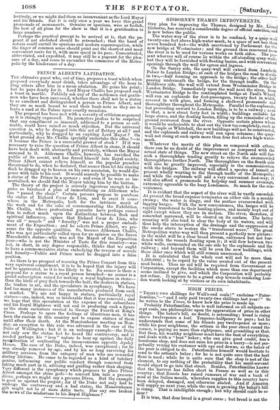PRINCE ALBERT'S LIPIDATION.
TIIE obtrusive guest who, out of time, proposes a toast which when proposed everybody must drink, takes advantage of the hour to drag others after him in a mean adulation. He gains his point; but he pays dearly for it. Lord Mayor Challis has proposed such a toast in marble. Publicly ask any of the noblemen and gentle. men who have been canvassed, whether there shall not be a statue to so excellent and distinguished a person as Prince Albert, and they are as much bound to send their bank-note as they are to leave a card at the Palace upon courtly occasions.
The proposal has beep, met with a severity of criticism as general as it is strongly expressed. Its promoters profess to be surprised that any compliment so innocent, a.ddressed to a person so esti- mable, could have raised so much objection. But the universal question is, why be dragged into this act of flattery at all ? and particularly, why be dragged by an expiring Lord Mayor ? On what ground does Mr. Challis Apecially undertake this office ?—is it because the Prince is a successful grower of stock ? If it was necessary to raise the question of Prince Albert in stone, it should have been dealt with abstractly and privately, without the Mayor annexed to it. Alderman Challis, however, has ravished the public of its assent, and has forced himself into Royal society. Prince Albert cannot relieve himself, as the popular preacher threatened to do, when he declared, that sooner than let his sinning flock be dragged up to heaven on his own ascension, he would dis- pense with tails to his coat. It would scarcely be possible to make a statue of the Prince in a spencer ; and even if he were so im- mortalized, we should find the Mayor taking him by the button.
The theory of the project is scarcely ingenious enough to dis- guise so barefaced a plan of immortalizing an Alderman who has " passed the chair." Certain persons propose to purchase the statue of Richard Cceur de Lion, and to erect it some- where in the Metropolis, both for the intrinsic merit of the work and for the sake of commemorating the Exhibition. Mr. Challis, whose professional pursuits have perhaps caused him to reflect much upon the distinctions between flesh and spiritual influences, opines that Richard Coeur de Lion, who was all " muscle " and " ferocity," was not a proper embodi- ment of the Exposition ; and he selects Prince Albert, we pre- sume for the opposite qualities. So, because Alderman Challis, who was not particularly called upon for an opinion on the Baron Marochetti's statue—who was not the Mayor of the Exposition year—who is not the Minister of Taste for this country—was not, in short, in any degree responsible, thinks that we ought to have a commemorative statue embodying the reverse of muscle and ferocity—Public and Prince must be dragged into a false position. As there is no prospect of rescuing the Prince Consort from this
very equivocal compliment, it is to be hoped that the injury will not be aggravated, as it is too likely to be. No sooner is there a proposal for a statue to a royal person broached—no sooner is a grand subscription raised for making a royal highness in stone— than the birds of prey flock towards the bait; the dealers in statues, the traders in art, and the speculators in sycophancy. We have had too many instances of the manufactures produced from such a market. We are not happy in statues, particularly royal statues—one, indeed, was so intolerable that it was removed ; and we hope that this speculation at the expense of the subscribers and his Royal Highness will not end in producing such a figure as the stone caricature erected to George the Fourth at King's Cross. Perhaps to spare the feelings of illustrious men, it has been the custom in this country not to expose statues of them until after their death. At the Mansicmhouse meeting on Mon- day, an exception to this rule was advanced in the case of the Duke of Wellington : but it is an unhappy example—the Duke not only saw the statue but he heard the controversy, and it needed perhaps his " iron" nature to bear up against the daily mortification of confronting the inconvenience opposite Apsley House. The case of the Duke, indeed, was exceptional ; for he was already removed by age, and by his so long surviving his military services, from the category of men who are rewarded during lifetime. He came to be regarded as a kind of tutelary genius, influencing our public conduct though removed from taking much part in it, advising and guiding rather than shaping. Very different is the sycophancy which proposes to place Prince Albert amongst the stone gods—to convert him into a prmsens divus, perhaps we might say a priesens Dives. But the example is good as against the project ; for if the Duke not only had to undergo the controversy and, a bad, statue the Mensionhouse gift might not be of more. Attic taste. Has any one broken the news of the misfortune to his Royal Highness ?


































 Previous page
Previous page